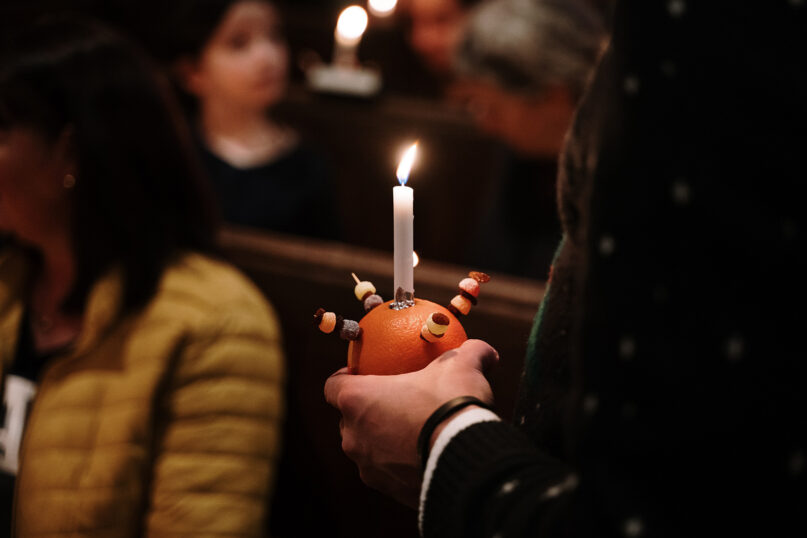(RNS) — My childhood Christmases were scenes straight off a Hallmark card. My family put up a real tree each year, usually cut from my grandparents’ land. They’d position the tree just right (with the inevitable bare spot in the back), lacing it with colored lights and silver tinsel, piling presents under it day by day until Christmas finally came.
All morning, while fresh white snow swirled in the frigid Maine air outside, and the wood stove warmed us inside, we took turns unwrapping endless ribboned mysteries. Later, we made our way back to my grandparents’ house for a farm-fresh dinner and spent the afternoon with cousins skating on the pond.
The Christmas holidays of my adult life have taken a very different form. I no longer live in a place likely to see snow on Christmas. For most of my adulthood, I’ve not lived near family. And being without children, I have nary a chance to re-create with them the joyous memories of Christmas past.
Being childless, as I am, at Christmas births a certain kind of nostalgia.
The fact is, in many ways — from the myth of Santa Claus to the televised “Charlie Brown Christmas” special, from shoe boxes filled with toys to church Christmas pageants starring bath-robed youngsters gathered in makeshift mangers — Christmas in modern America centers on children.
The reasons for this are more cultural than biblical. Those New England Christmases of my early life are more reflective of 19th-century Victorian Christmases of Old England than the Nativity scene in Bethlehem. (There likely wasn’t snow in Bethlehem on that morning two millennia ago!) Victorian Christmases — like all Christmases everywhere — were the product of the cultural forces of the age. The old Puritan strictures against festivals of previous centuries were fading, while commerce and material prosperity were increasing.
Queen Victoria’s German husband brought Christian traditions to England from his home country, and Charles Dickens published “A Christmas Carol,” so popularizing and sentimentalizing the holiday that Dickens would come to be called “the man who invented Christmas.” And it was the Victorians who transformed all of these cultural trends into an elevation of the nuclear family and children.
With all this history, it’s no wonder removing the wrappings of social and cultural customs from the true essence of Christmas can be so tricky.
There’s nothing wrong with Christmas reflecting the time and place in which it is celebrated, of course. In fact, that is one of the essential beauties — and truths — of the Christmas story: There is no one way to celebrate the wonders of his love.
But celebrating the wonders of God’s love is what Christmas is all about.
Family-centered traditions are rich and beautiful. After all, God is the one who created the family unit. Still, it can be hard for those without families near or with families broken beyond repair or without families at all, who must find other ways to bring the true meaning of Christmas to hearth, heart and home.
My many single and childless friends (it’s important for the church to recognize that many among these are immigrants and missionaries) have shared their own blessings and pains over years of Christmases. Some have nieces and nephews to spoil on Christmas Day. Some enjoy leading or helping with the children’s events at church, a service that also ministers to exhausted parents during a stressful season. For my husband and me, one of the most cherished Christmas traditions (until the pandemic hit) has been having dinner on Christmas Day at our neighbor’s home, along with a motley mix of others without family nearby.
But some holiday traditions offer particular challenges to those who aren’t part of a nuclear family at Christmas, challenges the rest of us might not even imagine. For example, when everyone else is sending out annual Christmas photos of a growing family, does the single person want to reciprocate with her own solo photo shoot? How does a childless member participate in family gift exchanges that only include the children? Does the pandemic mean singles need to give up indoor gatherings that would otherwise include friends from outside the household?
The church is just the place where traditions that include everyone can be cultivated for all members, those with family and those without — not only at Christmas, of course, but especially at Christmas.
Throughout my marriage, the most meaningful and significant time at Christmas for my husband and me was Christmas Eve at our church. For years, we helped lead the services, my husband as a musician and I as a reader of poetry and Scripture. As a worship team, we shared potluck meals and fellowship before and between services each time, a tradition that grew more important to us with each passing year. But then with the church’s closure, this beloved ritual was gone. But not the memories of it.
Traditions give birth to our sense of the past. It is this sense of — and, along with it, a longing for — the past that is the source of nostalgia. Nostalgia — whether for Christmases long gone, for a childhood outgrown or for dreams (like children) that never came to be — is a bittersweet reminder that this earthly place, filled with cherished traditions, treasured memories and painful disappointments — is not our permanent home. Yet, even so, the marvel of it all is that the God of the universe took on flesh, came here as a child and dwelt among us in this temporary home.
He is the gift that transcends all family ties and time-bound traditions. And, as one friend who experienced years of infertility and pregnancy loss recently reminded me, Scripture says it is “unto us a child is born.”
Because this child is for all of us, no one needs to feel childless at Christmas. But it can take the family of true community to help us unwrap the gift.






